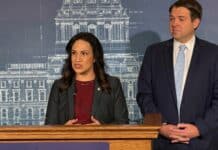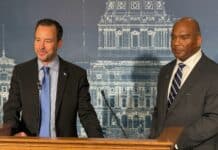
Gov. Tim Walz signed a bill this past June to fast track the permitting process for wind and solar projects in Minnesota. This was to ensure green energy projects meet the new 100% carbon-free (CF) goal by 2040—passed during the 2023 legislative session. He wanted them “to hit the ground running creating new jobs.” However, this latest initiative has raised an issue that has a nexus to the past and introduces confusion for the future.
Back in 2007, Gov. Tim Pawlenty signed the Next Generation Energy Act (NGEA) that mandated an 80% reduction in greenhouse gases by 2050. One key element of the bill was a moratorium against purchasing electricity produced by coal burning plants from other states. Minnesota needed more electricity than it could produce and bought power from North Dakota—who produced more than they needed. A convenient business arrangement between neighboring states. However, under the NGEA, Minnesota could no longer buy electricity produced by North Dakota’s coal fired plants. This was a noteworthy loss of state revenue and after negotiations failed, North Dakota sued Minnesota in 2011.
Former Minnesota Attorney General Lori Swanson defended the state and ultimately lost the federal case and the appeal. The court ruled that the Minnesota NGEA overstepped state authority by dictating how electricity was produced in another state. Minnesota violated the “commerce clause” of the 8th Amendment in an attempt to control conduct beyond state boundaries. The court emphatically stated (North Dakota v. Heydinger, No. 14-2156, U.S. 8th Circuit Court, 2016) that the NGEA, as it applied to coal, had “extraterritorial reach.” This action, they wrote, cannot be taken by a state, but only by the consent of Congress. Significantly slapped down, the Minnesota Public Utilities Commission and the Minnesota Commerce Department backed away from pursuing the matter to the U.S. Supreme Court. Instead, both agencies attempted to save face by claiming the state had made significant strides in energy and environmental issues all along. So, electricity from coal never stopped and continues to add capacity to the regional grid—which is the storehouse of available electricity derived from natural gas, coal, wind, solar, nuclear and other sources.
In light of the 2023 legislation, it appears this scenario may be on our horizon again. With the new Minnesota mandate of 100% CF by 2040, that means zero fossil fuels can be purchased from North Dakota or the “grid.” This means all Minnesota-based power must be produced by wind, solar, hydroelectric and nuclear to be qualified as CF. Recall the angst against “dirty coal” is that it produces carbon dioxide in the burning process—deemed to be a “climate change” producing trace gas.
North Dakota is no slouch in technology as Gov. Doug Burgum’s track record shows and they have been gearing up for years on “sequestration.” This is a process by which carbon dioxide is captured in the coal firing process and forced back down into the ground for “eternity.” Pipeline routes to carry carbon dioxide have been proposed in the Midwest and are causing significant controversy over their potential danger and eminent domain issues for travel routes with land owners and farm operators.
So with these issues again pending, Gov. Burgum and the North Dakota Industrial Commission have sent two letters to the Minnesota Public Utilities Commission (MN PUC) objecting to the latest CF mandate. In the most recent letter dated June 26, 2024, as reported in the North Dakota Monitor, the Commission states the Minnesota plan is unlawful in three ways. First, it attempts to regulate the commercial activity of another state, it conflicts with the Federal Powers Act because it seeks to restrict wholesale electrical sales, and it attempts to regulate carbon dioxide emissions which is a power only relegated to the Environmental Protection Agency. The letter excoriates Minnesota’s attempt to be an “island” in the large Midwest electrical grid system. As you might imagine, the letter contained a not so veiled threat for another lawsuit.
To add to the controversy, according to a Star Tribune article, the MN PUC must determine the definition of CF. Minneapolis DFLer, Jamie Long, who sponsored the legislation, gave no guidance on how carbon was to be measured and regulated. This is the challenge the Minnesota Pollution Control Agency is facing, too. Rep. Long said that “deciding if something is carbon-free is so complicated in part because it can vary based on the operations of a specific power plant,” the Star Tribune reported. As a result, we have a variety of power sources with no operational definitions as to their CF output. How can you monitor any progress with no agreed upon parameters of measurement? How is this responsible legislation?
In a party-line vote for the 2040 mandate, Republicans cautioned over the certain increased cost of electricity and the heightened concern for grid reliability. Rural electric co-ops have said they will have a hard time complying. All issues destined for future commentary, I assure you.
So what did Gov. Walz have to say about all this? “I am not a lawyer but I am surrounded by very good ones,” he said. “I trust that this bill is solid, I trust that it will stand-up because it was written to do exactly that. And just to be clear, Minnesota is not staking our future on coal and carbon”
So it appears that barring some compromise, battle lines are drawn once again to determine issues over climate change and how far Minnesota can go in controlling the activities of other states. One thing is certain—we are heading into a period of unknown energy transition and the issues over reliability and cost are on our doorstep. To be sure, the results of the November election will have a significant impact both state and nationally. Even more so now that Gov. Walz is the VP candidate for the Democrats.
The views and opinions expressed in this commentary are those of the author and do not represent an official position of Alpha News.









